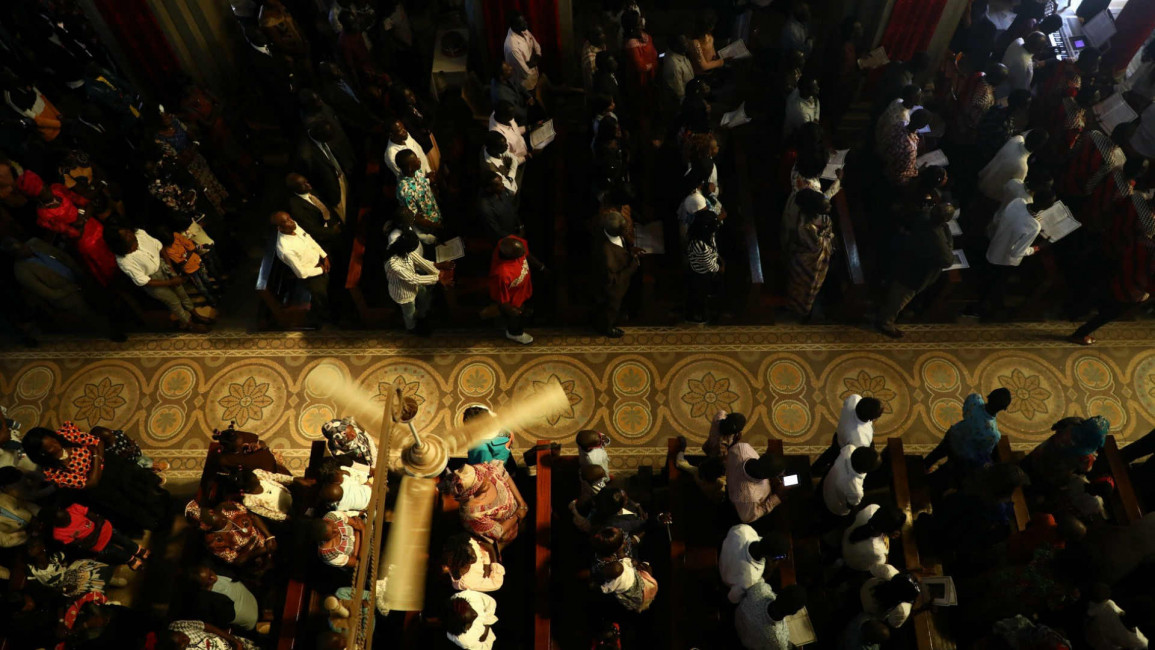Sudan celebrates Christmas publicly for first time in a decade
Christians and pro-democracy activists alike hailed the decision by Sudan's civilian cabinet as a move towards realising freedom and equality of religion in the country.
For almost three decades, Sudan was ruled by the Islamist regime of Omar al-Bashir.
Bashir's time in power came to an end in April, when months of mass protests against his regime led to a military coup and the subsequent formation of a transitional government.
Sudan's civilian prime minister has pledged to right the wrongs of the former regime by respecting all of the country's religions and putting an end to conflict in the Christian-majority south.
While the majority of Sudan's population are Sunni Muslims, a minority of Christians live in the country, mostly in the capital Khartoum and the rebel-held Nuba Mountains in the south.
Public Christmas celebrations were cancelled by Bashir in 2011 after the seccession of Christian-majority South Sudan.
Thousands of Christians celebrated the move to reinstate Christmas as a public holiday at St Matthew's church, the capital's oldest, Middle East Eye reported.
 |
| Sudanese gather outside St Matthew's Church in Khartoum to celebrate on Christmas Day [Anadolu] |
The decision was also praised by pro-democracy activists, some of whom have advocated for Sudan to depart from the draconian interpretation of Sharia law ushered in by Bashir and become a secular state.
|
|
"I'm so happy today because the situation is improving, and it's really good for us that it's an official holiday for the Sudanese - not just for the Christians," Nyaball Ezikel, a South Sudanese woman living in Khartoum, told MEE.
"This is also a good step towards the unity of the Sudanese people," said Ezikel.
Amna Azhari, a Khartoum University student who said Wednesday was her first time visiting a church, added: "We are becoming more tolerant and loving towards each other. This is the legacy of our great revolution."
Analysts say the issue is a sticking point in peace negotiations ongoing in the South Sudanese capital Juba between Khartoum and rebel leaders from Darfur, Blue Nile and the Nuba Mountains.
Read more: One year after Bashir's downfall, Sudan's revolutionaries sleep with one eye open
Religious Affairs Minister Nasr al-Deen Mufrah on Wednesday apologised for religious discrimination under Bashir.
The transitional cabinet of which Mufrah is a part has additionally pledged to return lands confiscated from churches and Christian organisations, and to reinstate Sunday as a holiday for Christians.
Prime Minister Abdalla Hamdok, for his part, celebrated the holiday alongside Sudanese beauty queen and anti-racism activist Natalina Yacoub, who hails from the Nuba Mountains.
"I was delighted to receive my Christmas gift from our colleague Natalina Yacoub, whose hard work is exemplary and inspiring," he said in a tweet. "This is the Sudan we dream of. One that respects diversity and enables all Sudanese citizens to practice their faith in a safe and dignified environment."
The State Department thanked the transitional government for its efforts "to address the previous regime's systematic, ongoing, and egregious violations of religious freedom".
Follow us on Twitter and Instagram to stay connected



